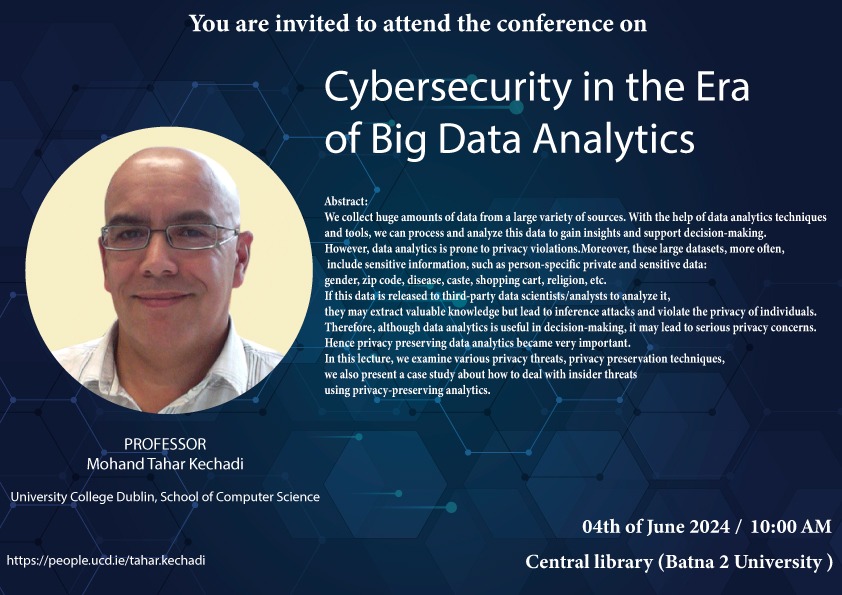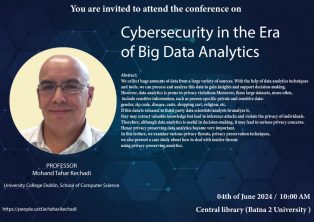
- This event has passed.

Cybersecurity in The Era of Big Data Analytics
يونيو 4, 2024

Professor Mohand Taher Kechadi, from the University of Dublin, will give a seminar on: “Cyber security in the Era of big data analytics”
Tuesday, June 04th, at 10 am in the Central library (Batna 2 University).
BIO
Professor M-Tahar Kechadi was awarded PhD and Masters degree – in Computer Science from University of Lille 1, France. He joined the UCD School of Computer Science (CS) in 1999. He is currently Professor of Computer Science at CS, UCD. His research interests span the areas of Data Mining, distributed data mining heterogeneous distributed systems, Grid and Cloud Computing, and digital forensics and cyber-crime investigations. Prof Kechadi has published over 260 research articles in refereed journals and conferences. He serves on the scientific committees for a number of international conferences and he organised and hosted one of the leading conferences in his area. He is currently an editorial board member of the Journal of Future Generation of Computer Systems and of IST Transactions of Applied Mathematics-Modelling and Simulation. He is a member of the communication of the ACM journal and IEEE computer society. He is regularly invited as a keynote speaker in international conferences or to give a seminar series in some Universities worldwide. The core and central focus of his research for the last decade is how to manage and analyse data quickly and efficiently. Nowadays we live in digital world, we produce more data than we can analyse and exploit. This `big data’ will continue to grow at rapid pace, will underpin new waves of innovation in nearly every sector of the world economy, and will reshape the way we build and use computers (hardware and software). Currently, his research interests are primarily in · Data Mining techniques and models and their execution environments and applications (Forensic data, Medical data, distributed, cloud/Grid type services, etc.) · Medical Data Mining: from knowledge to infrastructure. · Digital Forensics and cybercrime investigations. Data-intensive (or driven) real-world applications are all behind what we call today `big data’. The problem then is how to manage and process all these huge volumes of data. Both the analysis of large datasets and the computing environments created new problems and challenges for efficient execution and optimal system performance. This brought him to look at the challenges of the data mining in the heterogeneous, complex, distributed environment. For more effective and efficient analysis of large datasets we now recognise that data mining (DM) is a multi-step process and the user is at the centre of some steps. One of his research objectives is to study these steps and their interrelationships with regards to the overall process performance. We have started to understand the importance of some of these steps and their impact on the overall process. Another key objective is to design and develop DM techniques that delineate a careful division of work between the user and computer. One way to tackle this challenge is to provide constant feedback to the user and engage with the user only when it is required. And finally the scalability and privacy issues, as the datasets are becoming extremely large containing data of various types and pertaining to different systems or users. Recently, he is specifically looking at these issues from computer forensics and cybercrime investigations and healthcare perspectives.
